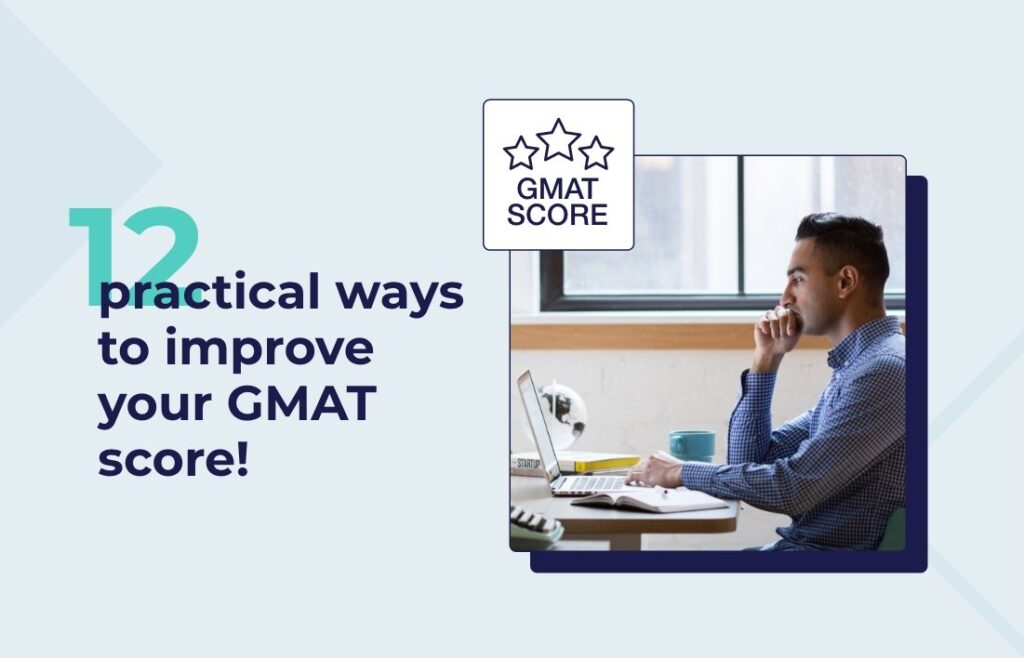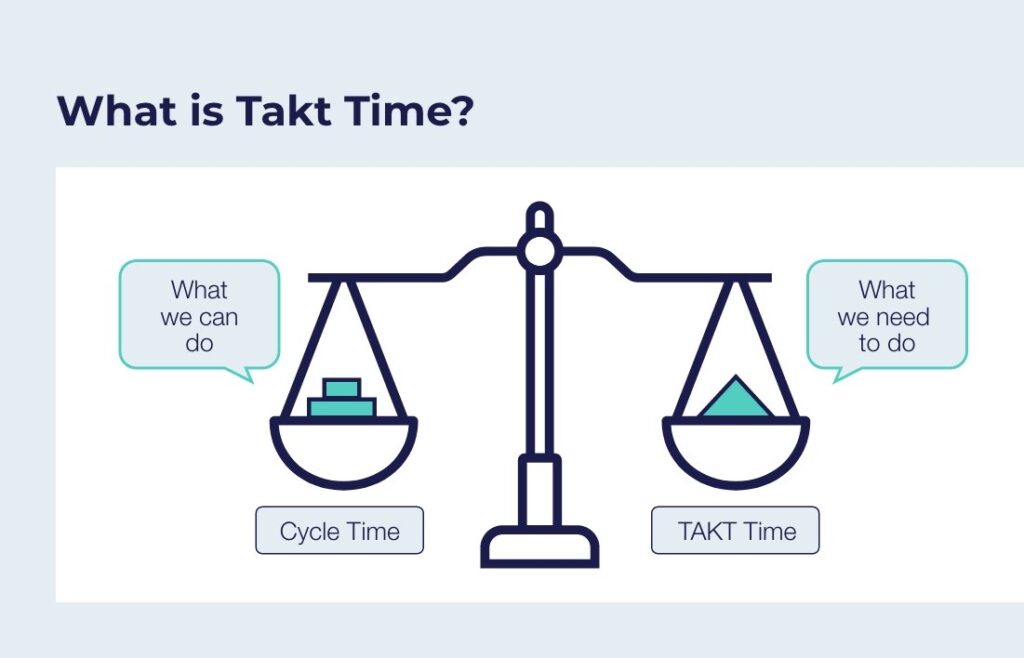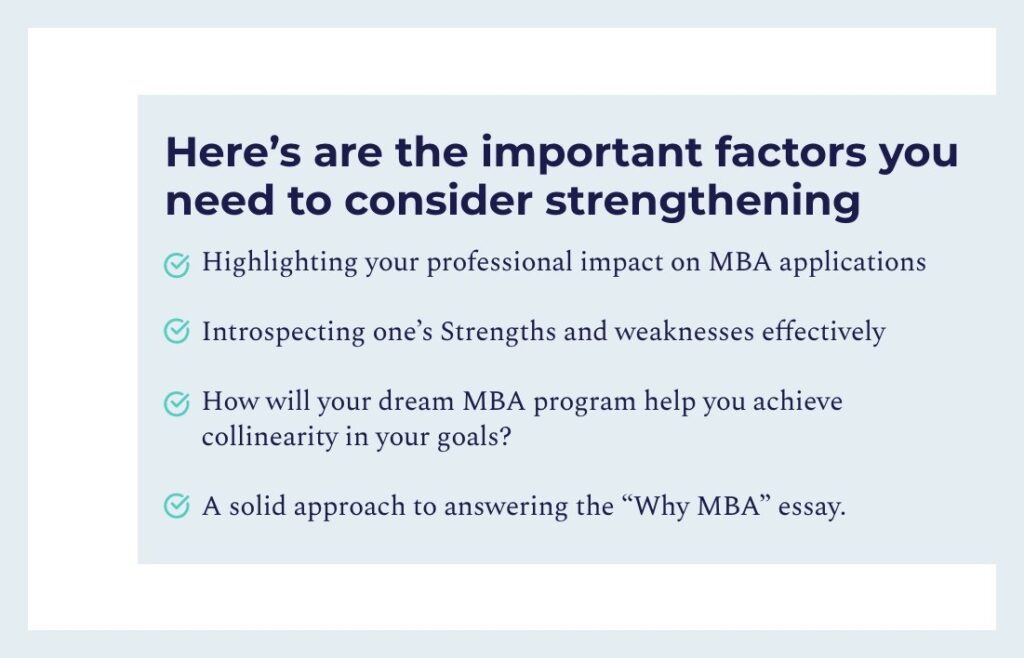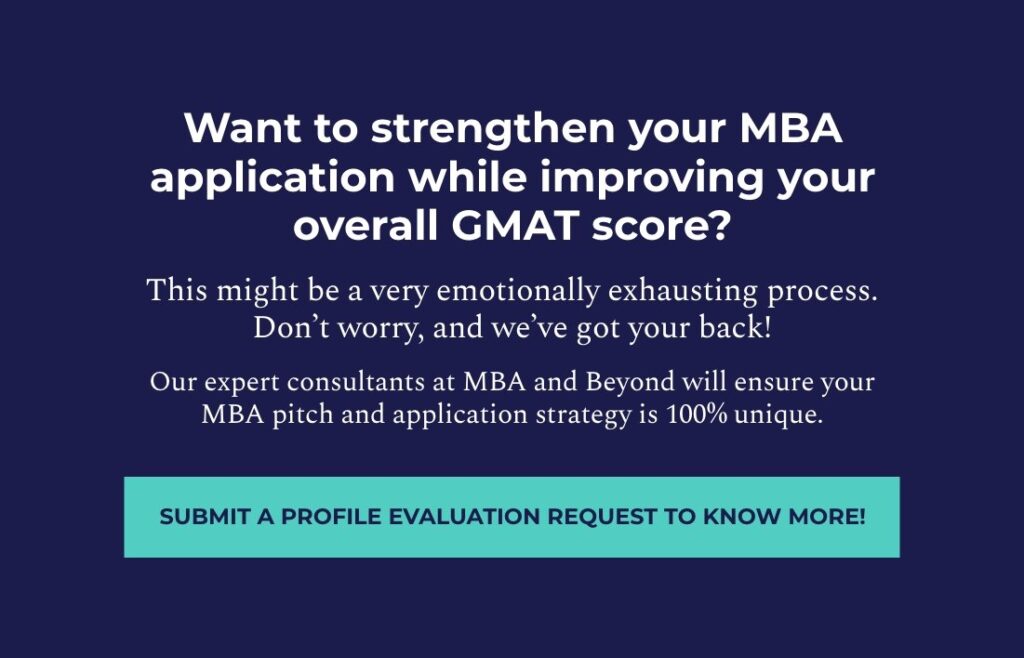Twelve practical ways to improve your GMAT score

The GMAT test is a reliable and strong predictor of academic achievement in MBA and other master’s degree programs in business. Furthermore, it gives a consistent assessment of intellectual ability for admissions officers who must choose candidates from diverse educational programs and undergraduate majors worldwide and varied levels of professional experience.
GMAT preparation is a marathon, not a sprint; it takes time to get a hold of it. Remember that no secret test-taking approach can guarantee you a perfect score in a couple of weeks (not, at least, if your starting score is far below that level).
This article will help you get some secret tips to improve your score and understand how you can strengthen your application strategy alongside GMAT preparation and improve your chances of selection by 2x.
THE SECTIONS OF GMAT; A BRIEF
GMAT is no joke, and it’s challenging for exam takers. Non-native English speakers may struggle with the Verbal and Analytical Writing Assessment sections. Students who have not reviewed basic arithmetic subjects in a long time may work with the Quantitative section. Knowledge of the GMAT sections is crucial.
The GMAT online exam evaluates the following skills for graduate business education: This part is broken into four sections, which are as follows:
Analytical Writing Evaluation (AWA)
Verbal Reasoning
Integrated Reasoning,
Quantitative Reasoning
A thorough examination of the GMAT;
Analytical Writing Assessment (AWA) – assesses your critical thinking and communication abilities.
Verbal Reasoning – assesses your ability to read and understand written information, analyze arguments, and modify written content to conform to standard written English.
Quantitative Reasoning assesses your ability to apply reasoning skills to investigate facts and draw conclusions.
Integrated Reasoning assesses your ability to examine data and interpret knowledge in various ways.
HOW TO IMPROVE YOUR OVERALL GMAT SCORE?
1) Get rid of flaws- GMAT is a game of analyzing. You need to analyze where you are consistently mistaken and work on it patiently. Create milestones for yourself after analyzing every mock for the next one.
Analyze and Correct Specific Flaws :
2) Analytical Writing Evaluation (AWA) – Paragraph one is about the introduction; in this section, try to identify the argument, mention the author’s point to support or dispute the statement, and indicate if you agree or disagree with the author’s point with reason.
Explain your perspective in paragraph two, and if you disagree with the argument, give two strong reasons why and how you disagree. Be brief and precise. Don’t veer too far from the subject.
What can be the resolution to the points you mentioned in the last paragraph to make the author’s argument more valid and logical?
3) Verbal Reasoning – Reading comprehension is more than merely reading them; to ace this portion, you must understand the actual words used to answer the questions and read and process the information more effectively. The same can be said about Sentence Correction and Critical Thinking. Verbal does not imply subjectively.’ Every question has a clear, conclusive answer, and the proper response has a logical rationale. “You must know the solution to justify it.” If you don’t already know the solution, more than one appears probable, and there’s no way to know which one is correct.” this is a poor excuse rather than an explanation; this may sound pretentious, but it is the truth of this section. You do not need to be a native English speaker to do well. A good reading habit is beneficial; nonetheless, the GMAT verbal is not so difficult that you cannot perform well if you are a non-native speaker with a very limited reading habit. Begin reading right away.
4) Integrated Reasoning – Data reading and analysis; Don’t rush to respond to a question. Instead, go slowly and grasp the question, even if you have to re-read it. Check to check whether you comprehend what the question is asking. It is challenging yet includes all the knowledge needed to answer the questions. Analyze each data source thoroughly because the questions require a complete understanding of the information.
Suggested Reading; Will a low GMAT IR score affect my chances if my GMAT is competitive?
5) Don’t make assumptions- Don’t let prior knowledge of the question influence your response. If the information is not included in the question, consider it null and void. Otherwise, you’ll have to figure out how one piece of data affects another. Many queries will ask you to use facts to build a response.
6) Go over all possible answers- Reading your response possibilities may also help you determine your solution because it may eliminate an answer alternative. Sort through the unnecessary material to find the important information. The amount of information offered by the GMAC with each question might quickly become overwhelming. On all requests, you will always receive irrelevant information. That is part of the test–you must figure out which elements of the charts/tables/graphs are relevant to the question.
7) Quantitative Reasoning – Improving your GMAT quant score is a difficult endeavor; nevertheless, if you can apply yourself and study smartly, you can see significant increases in your GMAT score; GMAT quant is more than just math; To improve your score, you must use reasoning skills as well as basic arithmetic concepts such as square difference, triangle properties, patterns in-unit digits, patterns in remainders, divisibility, algebraic translations, Venn diagrams, and permutations and combinations.
Enhancing your GMAT quant score will be tough unless you thoroughly understand the underlying math. Now, will knowing math be enough to get you a high GMAT quant score? Most likely not. The key is understanding how the GMAT employs basic mathematics to generate logic-based questions. To increase your GMAT quant score, you’ll need math knowledge and analytical thinking skills.
8) Take the following exams every two weeks: Take a quiz. Examine your areas of weakness (topic-wise or section-wise). Choose the first two or three weak subjects. Within two weeks, improve using guidelines, notes, and online discussions. Take another exam. Repeat as necessary. And make sure to have sufficient gaps between your mocks to give yourself time to work on your identified weaknesses.
9) The GMAT is different from other tests– It is not just about getting things right. It’s about getting the most things right in a limited time. Thus, to win the GMAT, you need to practice sticking to your timing, making educated guesses, and moving on from a tough question in case you cannot figure out the right approach within your Takt-Time.

10) Exposure Therapy: To learn to stay cool while taking the GMAT, you can imagine taking the GMAT in practice tests and feel and learn to manage any anxious responses that arise. If, when you think of the test, career-related pressure triggers anxious feelings, you could visualize yourself taking the test and feeling that pressure and practicing acknowledging that feeling without becoming anxious. You could imagine yourself getting an easy question and wondering whether that is a sign that you didn’t get the previous question correct. How do you respond to that situation? How do you want to respond? Consider each practice test as your D-Day, and you will learn to recognize and manage your anxiety.
11) Refer to the following official resources: Individual test maker manuals are unrivaled. Take as many official GMAT mock examinations as you can. However, keep in mind that taking the mock test, again and again will give you better results because when you try mock tests, several questions are repeated again and again. A good score will boost your morale, but consider this: if you already know the answers to a few questions, what’s the point of retaking the test? The best you can do is take the mock test twice and then focus on the areas you believe you need to improve to ace the GMAT sections.
12) Improve your test-taking and rest-taking abilities: Test-taking tactics must be included in test preparation. Timing techniques(how to manage to answer the question to save time for other sections). Strategies for rest. Strategies for avoiding ( avoiding the questions that are time-consuming). Strategies for guessing Alternative approaches (in quant). One must consider all of these factors to improve test-taking and test-taking abilities.
Read how you can build strong applications even with a low GMAT/GPA.
Business schools don’t care if you can calculate the area of a triangle. Instead, they are concerned with how well you assess data, prioritize, handle high-pressure circumstances, and make sound judgments – and this is where the GMAT comes in to analyze your thinking skills, analyzing skills, and the skills that a candidate should have while entering the B-school, and acing the GMAT at this level becomes critical.
HOW TO STRENGTHEN YOUR APPLICATIONS ALONGSIDE YOUR GMAT?

Most applicants tend to focus only on one aspect of their application, i.e., GMAT score, and give much less priority to the other elements of their apps (rookie mistake, especially if you are just 4-5 months away from your deadlines!). However, to break this myth for you, this is exactly the opposite of what adcoms are looking for! We talk to adcoms every year, and the one thing that is common across all B-schools is that they want to know who you are (without self-biases) and how you fit into the community, and GMAT is nothing but just a small aspect of the whole application. If your story does not make sense, no matter if you have an 800, you are very much out of the race! And almost all our successful applicants have started their journey at least 4-5 months before their deadline and with their GMAT.
Starting early helps you strategize beforehand if you don’t score as expected and makes your application independent of the GMAT.
You can start introspecting on bigger questions like why you want to do an MBA? How will MBA help you achieve your goals? What are your short-term and long-term goals? Is there any other way to achieve them in almost the same timeline as yours?
Once your higher-level questions are sorted, you must introspect other application aspects. For example, you need to consider your biggest achievements, strengths, failures, weaknesses, impact, and learnings from them. This may not look very important to you now but will play a very, very important role in defining your applications’ higher-level narrative, storyline, theme, and direction.
As soon as you have thoroughly explored your goals and personality, you can start defining your MBA pitch, like what your USP is and how your narrative will look. And, you can begin researching on selecting the right schools for yourself. Again, this may look like something too much for you right now and not very important, but this will ensure that your applications are very strong, even if you don’t score as high as you expected. And if you think you can do this even after your GMAT, ding ding ding! Yes, this is what you may hear from schools. But unfortunately, this is one of the biggest reasons why 90% of applicants get dinged– they don’t give enough time to their application strategy.
Suggested Reading; Consider the ‘Four C’s’ while choosing a Business School
Our consultants have discussed how you can improve your scores and strengthen your applications in our sessions. Register for the upcoming coffee session to speak to our consultants and address any of your concerns.

Preparation for the GMAT cannot be done in a week and nor can be your applications; you need the right time, strategy, and people to ace this process, and we are here with you to help you get a 360-degree evaluation of your strengths and weaknesses and help you build a unique MBA pitch. Schedule a one-on-one Profile evaluation call with our experts if you’d like. We are super duper excited to hear your stories, matey!




Leave a Reply